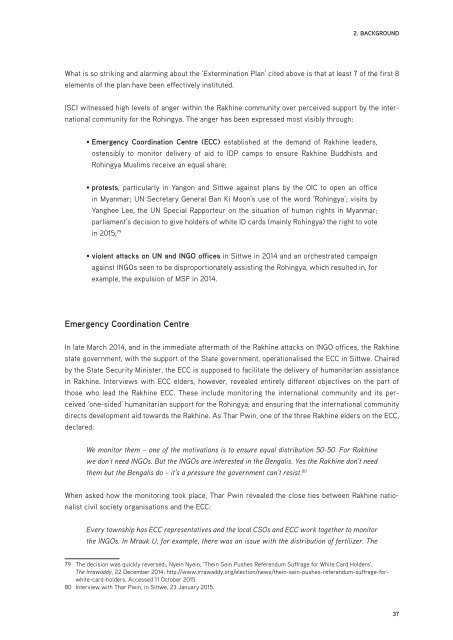Create successful ePaper yourself
Turn your PDF publications into a flip-book with our unique Google optimized e-Paper software.
2. BACKGROUND<br />
What is so striking and alarming about the ‘Extermination Plan’ cited above is that at least 7 of the first 8<br />
elements of the plan have been effectively instituted.<br />
ISCI witnessed high levels of anger within the Rakhine community over perceived support by the inter-<br />
national community for the Rohingya. The anger has been expressed most visibly through:<br />
• Emergency Coordination Centre (ECC) established at the demand of Rakhine leaders,<br />
ostensibly to monitor delivery of aid to IDP camps to ensure Rakhine Buddhists and<br />
Rohingya Muslims receive an equal share;<br />
• protests, particularly in Yangon and Sittwe against plans by the OIC to open an office<br />
in Myanmar; UN Secretary General Ban Ki Moon’s use of the word ‘Rohingya’; visits by<br />
Yanghee Lee, the UN Special Rapporteur on the situation of human rights in Myanmar;<br />
parliament’s decision to give holders of white ID cards (mainly Rohingya) the right to vote<br />
in 2015; 79<br />
• violent attacks on UN and <strong>IN</strong>GO offices in Sittwe in 2014 and an orchestrated campaign<br />
against <strong>IN</strong>GOs seen to be disproportionately assisting the Rohingya, which resulted in, for<br />
example, the expulsion of MSF in 2014.<br />
Emergency Coordination Centre<br />
In late March 2014, and in the immediate aftermath of the Rakhine attacks on <strong>IN</strong>GO offices, the Rakhine<br />
state government, with the support of the State government, operationalised the ECC in Sittwe. Chaired<br />
by the State Security Minister, the ECC is supposed to facilitate the delivery of humanitarian assistance<br />
in Rakhine. Interviews with ECC elders, however, revealed entirely different objectives on the part of<br />
those who lead the Rakhine ECC. These include monitoring the international community and its perceived<br />
‘one-sided’ humanitarian support for the Rohingya; and ensuring that the international community<br />
directs development aid towards the Rakhine. As Thar Pwin, one of the three Rakhine elders on the ECC,<br />
declared:<br />
We monitor them – one of the motivations is to ensure equal distribution 50-50. For Rakhine<br />
we don’t need <strong>IN</strong>GOs. But the <strong>IN</strong>GOs are interested in the Bengalis. Yes the Rakhine don’t need<br />
them but the Bengalis do – it’s a pressure the government can’t resist. 80<br />
When asked how the monitoring took place, Thar Pwin revealed the close ties between Rakhine natio-<br />
nalist civil society organisations and the ECC:<br />
Every township has ECC representatives and the local CSOs and ECC work together to monitor<br />
the <strong>IN</strong>GOs. In Mrauk U, for example, there was an issue with the distribution of fertilizer. The<br />
79 The decision was quickly reversed:, Nyein Nyein, ‘Thein Sein Pushes Referendum Suffrage for White Card Holders’,<br />
The Irrawaddy, 22 December 2014: http://www.irrawaddy.org/election/news/thein-sein-pushes-referendum-suffrage-forwhite-card-holders.<br />
Accessed 11 October 2015.<br />
80 Interview with Thar Pwin, in Sittwe, 23 January 2015.<br />
37



